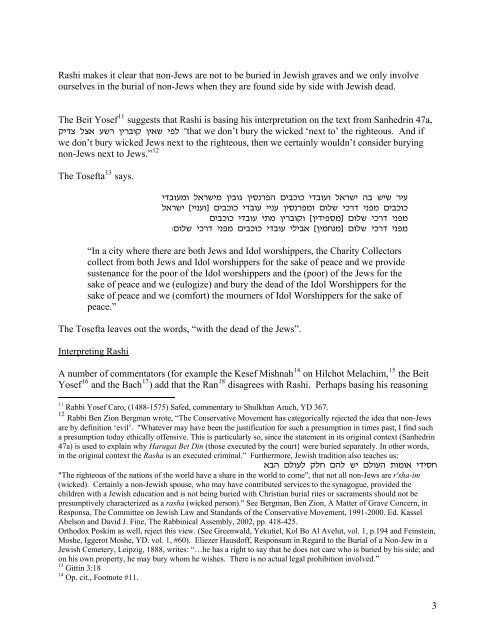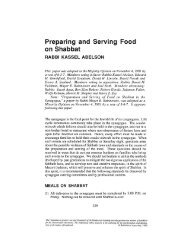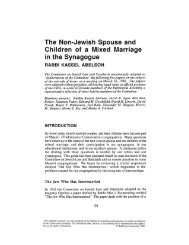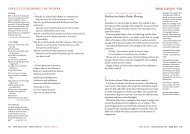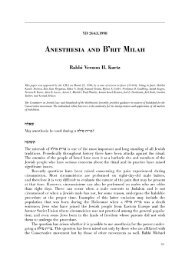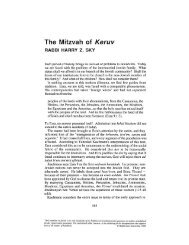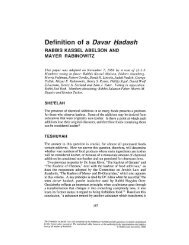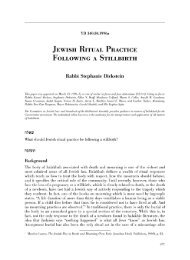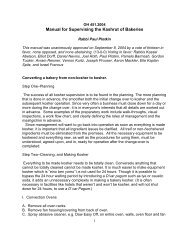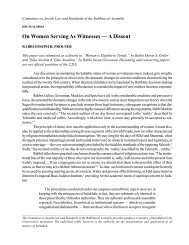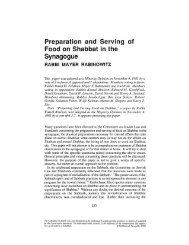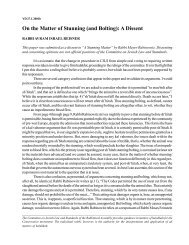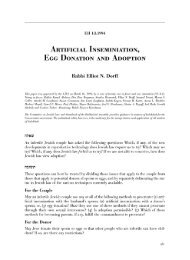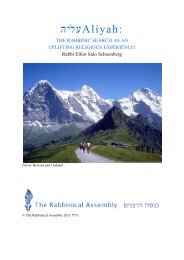Burial of a Non Jewish Spouse and Children - The Rabbinical ...
Burial of a Non Jewish Spouse and Children - The Rabbinical ...
Burial of a Non Jewish Spouse and Children - The Rabbinical ...
Create successful ePaper yourself
Turn your PDF publications into a flip-book with our unique Google optimized e-Paper software.
Rashi makes it clear that non-Jews are not to be buried in <strong>Jewish</strong> graves <strong>and</strong> we only involve<br />
ourselves in the burial <strong>of</strong> non-Jews when they are found side by side with <strong>Jewish</strong> dead.<br />
<strong>The</strong> Beit Yosef 11 suggests that Rashi is basing his interpretation on the text from Sanhedrin 47a,<br />
ehsm kmt gar ihrcue ihta hpk "that we don’t bury the wicked ‘next to’ the righteous. And if<br />
we don’t bury wicked Jews next to the righteous, then we certainly wouldn’t consider burying<br />
non-Jews next to Jews.” 12<br />
<strong>The</strong> Tosefta 13 says.<br />
hscugnu ktrahn ihcud ihxbrpv ohcfuf hscugu ktrah vc aha rhg<br />
ktrah [hhbgu] ohcfuf hscug hhbg ihxbrpnu ouka hfrs hbpn ohcfuf<br />
ohcfuf hscug h,n ihrcueu [ihshpxn] ouka hfrs hbpn<br />
:ouka hfrs hbpn ohcfuf hscug hkhct [ihnjbn] ouka hfrs hbpn<br />
“In a city where there are both Jews <strong>and</strong> Idol worshippers, the Charity Collectors<br />
collect from both Jews <strong>and</strong> Idol worshippers for the sake <strong>of</strong> peace <strong>and</strong> we provide<br />
sustenance for the poor <strong>of</strong> the Idol worshippers <strong>and</strong> the (poor) <strong>of</strong> the Jews for the<br />
sake <strong>of</strong> peace <strong>and</strong> we (eulogize) <strong>and</strong> bury the dead <strong>of</strong> the Idol Worshippers for the<br />
sake <strong>of</strong> peace <strong>and</strong> we (comfort) the mourners <strong>of</strong> Idol Worshippers for the sake <strong>of</strong><br />
peace.”<br />
<strong>The</strong> Tosefta leaves out the words, “with the dead <strong>of</strong> the Jews”.<br />
Interpreting Rashi<br />
A number <strong>of</strong> commentators (for example the Kesef Mishnah 14 on Hilchot Melachim, 15 the Beit<br />
Yosef 16 <strong>and</strong> the Bach 17 ) add that the Ran 18 disagrees with Rashi. Perhaps basing his reasoning<br />
11 Rabbi Yosef Caro, (1488-1575) Safed, commentary to Shulkhan Aruch, YD 367.<br />
12 Rabbi Ben Zion Bergman wrote, “<strong>The</strong> Conservative Movement has categorically rejected the idea that non-Jews<br />
are by definition ‘evil’. "Whatever may have been the justification for such a presumption in times past, I find such<br />
a presumption today ethically <strong>of</strong>fensive. This is particularly so, since the statement in its original context (Sanhedrin<br />
47a) is used to explain why Harugai Bet Din (those executed by the court} were buried separately. In other words,<br />
in the original context the Rasha is an executed criminal.” Furthermore, <strong>Jewish</strong> tradition also teaches us;<br />
tcv okugk ekj ovk ah okugv ,unut hshxj<br />
"<strong>The</strong> righteous <strong>of</strong> the nations <strong>of</strong> the world have a share in the world to come", that not all non-Jews are r'sha-im<br />
(wicked). Certainly a non-<strong>Jewish</strong> spouse, who may have contributed services to the synagogue, provided the<br />
children with a <strong>Jewish</strong> education <strong>and</strong> is not being buried with Christian burial rites or sacraments should not be<br />
presumptively characterized as a rasha (wicked person)." See Bergman, Ben Zion, A Matter <strong>of</strong> Grave Concern, in<br />
Responsa, <strong>The</strong> Committee on <strong>Jewish</strong> Law <strong>and</strong> St<strong>and</strong>ards <strong>of</strong> the Conservative Movement, 1991-2000. Ed. Kassel<br />
Abelson <strong>and</strong> David J. Fine, <strong>The</strong> <strong>Rabbinical</strong> Assembly, 2002, pp. 418-425.<br />
Orthodox Poskim as well, reject this view. (See Greenwald, Yekutiel, Kol Bo Al Avelut, vol. 1, p.194 <strong>and</strong> Feinstein,<br />
Moshe, Iggerot Moshe, YD. vol. 1, #60). Eliezer Hausd<strong>of</strong>f, Responsum in Regard to the <strong>Burial</strong> <strong>of</strong> a <strong>Non</strong>-Jew in a<br />
<strong>Jewish</strong> Cemetery, Leipzig, 1888, writes: “…he has a right to say that he does not care who is buried by his side; <strong>and</strong><br />
on his own property, he may bury whom he wishes. <strong>The</strong>re is no actual legal prohibition involved.”<br />
13 Gittin 3:18<br />
14 Op. cit., Footnote #11.<br />
3


